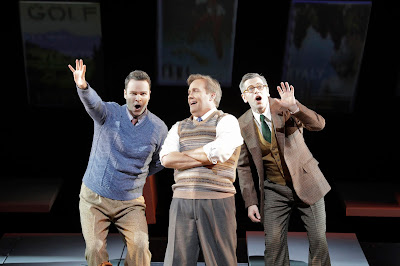It’s blessed with a cast of strong singers, it follows the story in director Frank Capra’s 1946 film more or less as you know it and there are many gorgeous highlights in San Francisco Opera’s east coast premiere of Jake Heggie’s It’s a Wonderful Life. Disappointingly, it’s also pumped with sugary entertainment and doesn’t pull at the heartstrings like it could.
 |
| Golda Schultz as Clara and the Angel Quartet, It's a Wonderful Life |
Imagining Capra’s film told through the art of opera doesn’t seem so difficult. Capra’s film, which he based loosely on the short story and booklet by Philip Van Doren Stern, The Greatest Gift, has many ingredients that lend itself to opera. While recognising that an oversimplification of suicidal circumstances exists in the storytelling, when George is on the brink of suicide, he is given the chance to face life again. Here, it’s not by the genial Clarence of the movie, but a guardian angel of the female sex called Clara. In a pre-performance talk, Heggie gives a solid reason for the change: the angel is given greater presence in his work and the female voice gives the contrast in voice needed. Getting across the palatable sentimentality, dry wit and cozy mix of morbidity and cheer that resides in the film is far more difficult.
 |
| William Burden as George Bailey and Golda Schultz as Clara |
But something in the concoction is unbalanced. How on earth could the duo think their dreamt up goofy Polynesian dance called the “Mekee-Mekee” was going to lift Capra’s narrative tune? What was a morsel of a reference to young George’s National Geographic subscription and his idea of exotic adventures in the film is turned into a full-blown musical trivialisation of the greater poignant picture, not to mention its sheer cultural misappropriation. Worse, its upbeat tune that begins to sound more like an advertising jingle keeps on appearing as a bemusing motif. And if there wasn’t already enough patriotic fare in an American’s day, there’s a prominent glorious anthem that celebrates going to war as one big community in another preferably discarded number.
Apart from the cheesy choreography that slips in and comic attempts that don’t always cut it, director Leonard Foglia fortunately moves his cast around admirably, giving them much interactive life.
 |
| Andriana Chuchman and William Burden |
Despite the shortcomings, Heggie, Scheer and Foglia’s artistry combine in giving affecting emotion to character-focused scenes. Fervent, theatre-filling tenor William Burden sings with gusto as George Bailey, a man whose dreams get clipped by his own selfless attitude. Burden lacks some of the charisma and step of an all-round loveable lad but he builds his performance splendidly, up to the explosive highlight when $8000 is all that lies between him and his life.
George’s devoted wife Mary is convincingly portrayed and sung in refined velvety class by soprano Andriana Chuchman. And as Clara, angel second class who is both saving George and depending on him in her mission to gain her wings, sapphire-gleaming soprano Golda Schultz soars radiantly in voice as a star of the stage. The two sopranos are given some of the most exciting and colourific operatic music and it raises the drama as hoped. In another highlight, Schultz and Chuchman share a touching ethereal duet in Act 2 that ponders on why George can’t see what they see in him. Clara’s presence is almost always felt on stage from the moment she sings from her swing in the night sky over Bedford Falls and Schultz gives her angel warmth and potency throughout.
 |
| Joshua Hopkins, William Burden and Keith Jameson |
At the musical helm, conductor Patrick Summers introduced the score with vitality, depth and a keen sense of balance with the onstage artists. Stylistic changes in the music, however, occasionally caught the singers out on the opening beat. Still, Heggie’s ability to align and overlay one style with another shone through. In this case, it wasn’t necessarily the formula hoped for.
It looked like the average age of Thursday evening’s audience was north of 50 and it felt like Heggie’s holiday season work didn’t quite work in the opera house and isn’t yet ready for Broadway.
It’s a Wonderful Life
San Francisco Opera
War Memorial Opera House
Until 9th December, 2018
Production Photos: Corey Weaver
No comments:
Post a Comment